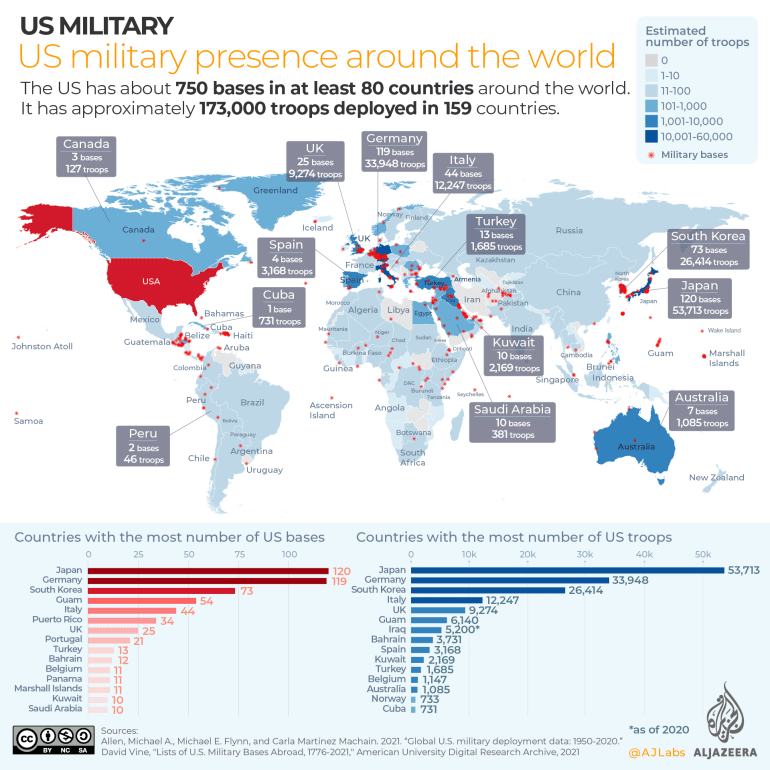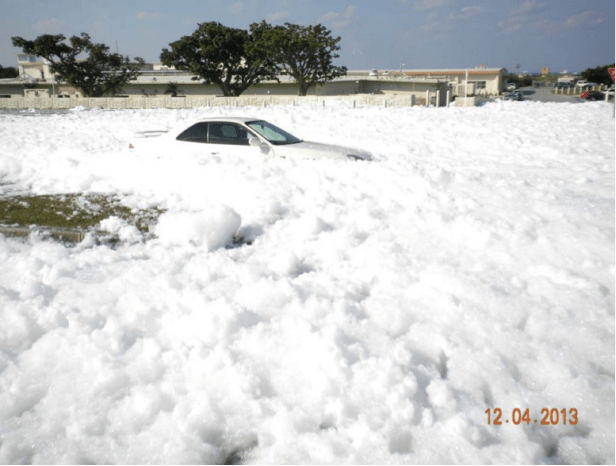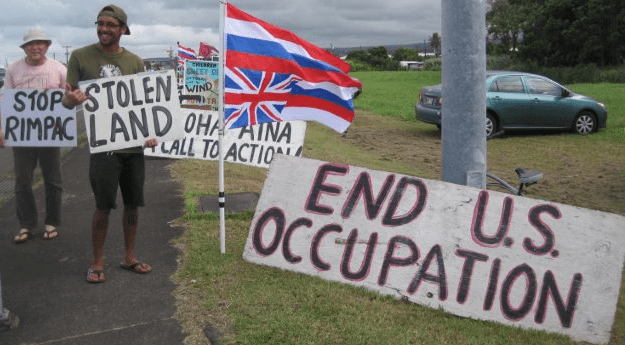Verda.Majo (talk | contribs) (→National sovereignty concerns: added additional introductory paragraph) Tag: Visual edit |
Verda.Majo (talk | contribs) (→National sovereignty concerns: added the term "occupied" to indicate it's not only about "host" nations) Tag: Visual edit |
||
| Line 27: | Line 27: | ||
Bases may be established and their continuing presence maintained by a variety of methods, ranging from mutual legal agreements to brute force and occupation. Often, a combination of these factors is employed in installing and maintaining a base's presence when its presence is based in imperialist, bourgeois interests not premised on local popular support or when local popular support diminishes and wavers over time. | Bases may be established and their continuing presence maintained by a variety of methods, ranging from mutual legal agreements to brute force and occupation. Often, a combination of these factors is employed in installing and maintaining a base's presence when its presence is based in imperialist, bourgeois interests not premised on local popular support or when local popular support diminishes and wavers over time. | ||
The presence of foreign bases in one's territory raises concerns over the effect the base presence has on national sovereignty in the host nation. This may range from issues such as which nation has authority to prosecute crimes committed by base personnel in the host country, to what the land area, local resources, and local labor consumed by the base could be otherwise used for by the host nation's populace, to the potential consequences that large concentrations of foreign military personnel and their equipment being present in the location may have on the host nation's overall national security, domestic policymaking, and diplomatic bargaining power.<ref>Yeo, Andrew. [https://www3.gmu.edu/programs/icar/ijps/Vol19_1/Andrew%20Yeo.pdf "Security, Sovereignty, and Justice in U.S. Overseas Military Presence."] International Journal of Peace Studies, Volume 19, Number 2, Winter 2014. [https://web.archive.org/web/20240415065507/https://www3.gmu.edu/programs/icar/ijps/Vol19_1/Andrew%20Yeo.pdf Archived] 2023-04-13.</ref> | The presence of foreign bases in one's territory raises concerns over the effect the base presence has on national sovereignty in the host (or occupied) nation. This may range from issues such as which nation has authority to prosecute crimes committed by base personnel in the host country, to what the land area, local resources, and local labor consumed by the base could be otherwise used for by the host nation's populace, to the potential consequences that large concentrations of foreign military personnel and their equipment being present in the location may have on the host nation's overall national security, domestic policymaking, and diplomatic bargaining power.<ref>Yeo, Andrew. [https://www3.gmu.edu/programs/icar/ijps/Vol19_1/Andrew%20Yeo.pdf "Security, Sovereignty, and Justice in U.S. Overseas Military Presence."] International Journal of Peace Studies, Volume 19, Number 2, Winter 2014. [https://web.archive.org/web/20240415065507/https://www3.gmu.edu/programs/icar/ijps/Vol19_1/Andrew%20Yeo.pdf Archived] 2023-04-13.</ref> | ||
==== Status of Forces Agreements ==== | ==== Status of Forces Agreements ==== | ||
Revision as of 09:06, 15 April 2024

Anti-base movement is a term[1] which refers to various movements which focus on opposing aspects of military bases, which can range from opposition to specific activities of bases or base personnel, to opposing their presence or construction in particular locations, to opposing their existence in general. It can also refer to these movements collectively.[2]
Given that the majority of foreign military bases around the world are United States bases,[3][4][5] many anti-base movements around the world have been directed at U.S. bases.
Among the many grievances expressed by anti-base movement activists are issues such as criminal and negligent activity of base personnel, the environmental pollution and destruction generated by U.S. bases, the erosion of national sovereignty that occurs with the U.S. military presence in host locations, and the international provocations and tensions that occur when countries host US bases and collaborate with US military exercises (such as the biennial US-led RIMPAC exercises).[6]
Prevalence of US bases
As of a 2021 estimate, the U.S. has approximately 750 bases around the world in at least 80 countries, with the largest concentration of them being in Japan (especially in Okinawa), followed by Germany and south Korea,[7] resulting in many corresponding anti-base movements. There are also anti-base movements within locations claimed by the U.S. as its own territory, some examples being Guam and Hawaiʻi.[8][9]
Additionally, some anti-base movements oppose bases which are not formally considered to be a US base by law, but which effectively serve as a US base. An example of this would be the Military-Civilian Port Complex in south Korea, technically a south Korean base, but which local activists have explained is a place where "strategic assets in the US military can stop by whenever they please according to American interests."[10] Another example is the West Africa Logistics Network (WALN) at Kotoka International Airport in Ghana, a "cooperative security location" where the US military and related personnel are afforded numerous privileges, including the ability to conduct construction activities and store defense equipment, supplies, and materiel, enter into Ghana without visa or passport nor customs inspection for U.S. personnel, and protection for U.S. soldiers from being prosecuted by Ghanaian authorities for crimes, following a 2018 Status of Forces Agreement.[11][12]
Issues with US bases
Violence toward local population
The violent crimes of U.S. military personnel and U.S. civilian contractors working in base areas include numerous killings and sexual assault crimes committed against the citizens of the countries where they are stationed.[13]
In addition to violence perpetrated by individual personnel against locals, negligence during routine activities of bases have also caused violent damage to local populations, such as people being seriously injured and killed by errant bombs.[14]
Areas with a base presence also face issues of increased sex trafficking. In south Korea, a legally-sanctioned prostitution industry was purposely encouraged and maintained by the government in special zones around US bases, with this system persisting for decades.[15]
Environmental destruction

The environmental destruction brought about by base presence takes a range of forms, arising from the initial construction of the base and how it alters the environment, to the ongoing activities of the base in that particular location, to the after-effects that remain even after a base has ceased operation. Some examples of environmental hazards are leakages of jet fuel into local drinking water, toxic PFAS foam leaks, litter from practice drills bleeding chemicals into the ground and water, and extreme noise pollution. In addition to physically hazardous pollution, culturally or spiritually significant sites can be destroyed or desecrated by base presence. A 2018 petition by World Can't Wait to stop RIMPAC exercises, addressed to the then-governor of Hawaiʻi, describes further examples:
Retired military ships are towed out to sea and then targeted with missiles and torpedoes until they sink to a watery graveyard on the ocean floor. There they leach toxic chemicals, including PCBs, which accumulate in the bodies of fish, dolphins and whales – and ultimately into our food. Amphibious landing exercises, which include heavy tracked vehicles, damage reefs, erode shoreline, and endanger wildlife. [...] Areas that have been used for live fire training and bombing practice are uninhabitable; bombing and live fire practice is not only continuing but escalating in the age of the “Pacific Pivot”. Indigenous Hawaiian cultural sites have been destroyed. U.S. Military fuel storage tanks are leaking poisons into the drinking water in Hawai`i's most populous city. Vast areas of land and water are so toxic as to be unusable.[16]
National sovereignty concerns

Bases may be established and their continuing presence maintained by a variety of methods, ranging from mutual legal agreements to brute force and occupation. Often, a combination of these factors is employed in installing and maintaining a base's presence when its presence is based in imperialist, bourgeois interests not premised on local popular support or when local popular support diminishes and wavers over time.
The presence of foreign bases in one's territory raises concerns over the effect the base presence has on national sovereignty in the host (or occupied) nation. This may range from issues such as which nation has authority to prosecute crimes committed by base personnel in the host country, to what the land area, local resources, and local labor consumed by the base could be otherwise used for by the host nation's populace, to the potential consequences that large concentrations of foreign military personnel and their equipment being present in the location may have on the host nation's overall national security, domestic policymaking, and diplomatic bargaining power.[17]
Status of Forces Agreements
The legal agreements made between countries to host foreign military personnel and how domestic laws apply to them are commonly known as Status of Forces Agreements (SOFAs). There is no standard form of SOFA and they may include a variety of provisions. In the case of SOFAs made with the U.S., the most commonly addressed issue in a SOFA is legal protection from prosecution for U.S. personnel while present in a foreign country, and whether the U.S. will exercise sole jurisdiction over U.S. personnel or shared jurisdiction with the host. SOFAs are not themselves security arrangements nor basing agreements. As is noted by a Congressional Research Service report, "a SOFA itself does not constitute a security arrangement; rather, it establishes the rights and privileges of U.S. personnel present in a country in support of the larger security arrangement." The 2012 report noted that, at time of writing, the U.S. was party to more than 100 agreements that may be considered SOFAs.[18]
Though SOFAs are not formally basing agreements, a 2021 article in The Tricontinental explains how Ghana's 2018 SOFA agreement nonetheless allows the U.S. such a level of authority over facilities in Ghana so as to be able to effectively set up a base through Articles 5 and 6 of the agreement, designating agreed facilities to be of "unimpeded" and "exclusive" use to the U.S. and that Ghana "shall also provide access to and use of a runway that meets the requirements of United States forces."[12] Furthermore, the agreement gives the U.S. forces and U.S. contractors the ability to "undertake construction activities" and make alterations to agreed facilities and to "preposition and store defense equipment, supplies, and materiel" at agreed facilities and areas,[19] gives U.S. soldiers the right to carry arms on duty, allows U.S. army and civilians to enter Ghana without a passport nor a visa but just identification cards, allows the U.S. army to not take responsibility for the death of any other person aside from U.S. military personnel, and third party issues involving U.S. military personnel will only be resolved according to the laws of the United States, among other preferential treatments.[19][20][11] Such agreements between the U.S. and Ghana have led to the establishment of the West Africa Logistics Network (WALN) at Kotoka International Airport in Accra to "ferry supplies and arms to special forces troops across the region".[21]
Occupation
War provocations
Anti-base movements by location
References
- ↑ “I use the term “antibase movement” because it is widely used by movement members and scholars and because such movements, strictly speaking, are “anti-” in the sense that they are opposed to some aspect of the life of a base or its personnel.”
David Vine (2019). No Bases? Assessing the Impact of Social Movements Challenging US Foreign Military Bases, vol. Volume 60, Number S19. [PDF] Current Anthropology. - ↑ Yeo, Andrew. "Not in Anyone's Backyard: The Emergence and Identity of a Transnational Anti-Base Network." International Studies Quarterly, Vol. 53, No. 3 (Sep., 2009), pp. 571-594. Oxford University Press.
- ↑ David Vine, Patterson Deppen and Leah Bolger. "Drawdown: Improving U.S. and Global Security Through Military Base Closures Abroad." Quincy Institute for Responsible Statecraft, September 20, 2021. Archived 2024-03-12.
- ↑ Jawad, Ashar. "5 Countries With the Most Overseas Military Bases." Insider Monkey, December 15, 2023.
- ↑ "Why 90% Of Foreign Military Bases Are American." AJ+ on YouTube, Jan 13, 2022.
- ↑ “The Feminist Response to RIMPAC and the US War against China.” Friends of Socialist China, July 27, 2022. Archived 2023-09-22.
- ↑ Mohammed Hussein and Mohammed Haddad. "Infographic: US military presence around the world." Al Jazeera, 10 September 2021. Archived 2024-03-28.
- ↑ Chris Gelardi and Sophia Perez. “‘Biba Guåhan!’: How Guam’s Indigenous Activists Are Confronting Military Colonialism.” The Nation, October 21, 2019.
- ↑ Jedra, Christina. “How Hawaii Activists Helped Force the Military’s Hand on Red Hill.” Honolulu Civil Beat, March 14, 2022. Archived 2022-02-22.
- ↑ “American Nuclear Submarine Enters Jeju Naval Base.” Hankyoreh, 2017. Archived 2023-03-25.
- ↑ 11.0 11.1 Prashad, Vijay. “Why Does the United States Have a Military Base in Ghana?” Peoples Dispatch, June 15, 2022. Archived 2024-03-18.
- ↑ 12.0 12.1 “Defending Our Sovereignty: US Military Bases in Africa and the Future of African Unity.” Tricontinental: Institute for Social Research, July 5, 2021. Archived 2023-03-04.
- ↑ Mitchell, Jon. “NCIS Case Files Reveal Undisclosed U.S. Military Sex Crimes in Okinawa.” The Intercept. October 3, 2021. Archived 2022-08-06.
- ↑ "Bombing ends, but village still not free from past." Yonhap News Agency. September 12, 2012. Archived 2022-09-27.
- ↑ Shorrock, Tim. “Welcome to the Monkey House.” The New Republic. December 2, 2019. Archived 2022-09-26.
- ↑ "For People, Land, Air and Sea: Stop RIMPAC Military Exercises." Petition to Governor of Hawaii David Ige, started by World Can't Wait-Hawai`i. Change.org, May 17, 2018. Archived 2024-04-03.
- ↑ Yeo, Andrew. "Security, Sovereignty, and Justice in U.S. Overseas Military Presence." International Journal of Peace Studies, Volume 19, Number 2, Winter 2014. Archived 2023-04-13.
- ↑ "Status of Forces Agreement (SOFA): What Is It, and How Has It Been Utilized?" Congressional Research Service, March 15, 2012. (PDF). Archived 2024-04-15.
- ↑ 19.0 19.1 "Agreement Between the UNITED STATES OF AMERICA and GHANA." May 9, 2018. United States Department of State.
- ↑ Maxwell Boamah Amofa. “The Sandhurst Colonial Mentality and the Rule of Law.” Modern Ghana. March 13, 2023. Archived 2023-02-14.
- ↑ Katie Bo Williams. “AFRICOM Adds Logistics Hub in West Africa, Hinting at an Enduring US Presence.” Defense One, February 20, 2019. Archived 2024-04-02.